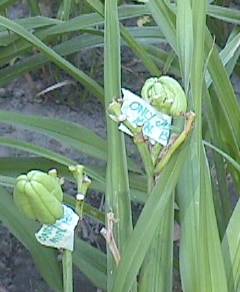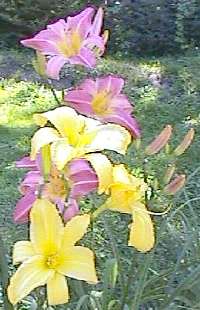
In the early Fall, preparation for Winter begins as foliage is trimmed to 8 - l0 inch height. The
removed foliage should be discarded, to avoid re-infection in the following season from any
disease harbored in the foliage. The foliage remaining on the clump is left to die back as it may.
Some growers mulch the beds for Winter; Zettek does no intentional mulching. Of course, if a
grower has a need for Winter protection, adding mulch is preferred over planting the daylily
deeper.
Some varieties are evergreen, or have varying hardiness. Catalog statements of hardiness zones
should not be considered gospel. Three terms are used:
- Evergreen - Season's foliage visible through Winter
- Semi-evergreen - Some stubs of foliage visible
- Dormant - Foliage dies back completely
 When division and Winter preparation are complete, the efforts of many daylily lovers turn to
propagation by seed. Careful pollination of blooms is done in the Summer, and resulting seed
pods allowed to develop. The pod is picked when brown and about to open. The seeds within
require stratification, and are kept dry. Zettek keeps seed in a plastic bag in the refrigerator for
six weeks. The seed is sown a half inch deep in seed-starting soil, encouraged with bottom heat
from an electric mat.
When division and Winter preparation are complete, the efforts of many daylily lovers turn to
propagation by seed. Careful pollination of blooms is done in the Summer, and resulting seed
pods allowed to develop. The pod is picked when brown and about to open. The seeds within
require stratification, and are kept dry. Zettek keeps seed in a plastic bag in the refrigerator for
six weeks. The seed is sown a half inch deep in seed-starting soil, encouraged with bottom heat
from an electric mat.
For quick propagation, (vegetative) division is the rapid method - for plants started from seed
will take two to three years to bloom. But it is in propagation by seed that new hybrids are
created.
Charlie's efforts have been directed toward small rock garden hybrids, of twelve inch height and
small flower size. Daylily hybridization is so popular that new varieties register four-word names,
e.g. "Rocky Mountain Morning Sunshine", to remain unique !
Perhaps you wish for a source of help for your daylily dilemmas. Or, you may look for a good
source for divisions. A daylily society will be your answer for both. Large societies such as the
American Hemerocallis Society
provide a newsletter, exhibitions with judging, and contacts with
regional growers. AHS has regional chapters such as
New York State Region 4,
and within Region 4 is the
Finger Lakes Daylily Society.
The excellent newsletter of Region 4 is provided by Tom and Kathy Rood of Grace Gardens in
Penn Yan. Regional groups also produce lists of varieties voted favorites in the area (link to such
a list). Joining a regional group is an excellent way for a gardener to increase their daylily
understanding and familiarity with available varieties. Zettek is an active society member and
judge on the regional level.
 |
Some of the pioneering daylily efforts in Rochester live on. In the past, Richard Bennett had a
popular garden on Long Pond Road. He sold area gardeners plants from the hundreds he had
collected. As a well-known hybridizer, Bennett had forty three registered varieties, well-suited to
Rochester conditions.
Charlie Zettek and other enthusiasts plan to create a Bennett Memorial
Garden using only Bennett hybrids in a public setting.
Efforts continue to find plants of the Bennett hybrids. Of the forty-three registered varieties,
twenty eight have been acquired. If you have a Bennett variety, Zettek would be happy to hear
from you !
|
Bennett varieties:
Seneca Moon & Doris Carey |
If you are looking for a low maintenance, summer-flowering perennial,
try daylilies. Area enthusiasts like Charlie Zettek are excellent sources
of plant material and advice!
<<<< Back
Daylily Gallery >>>>
[ Past Spotlight features ]...
[ Rochester Gardening site map ]
 When division and Winter preparation are complete, the efforts of many daylily lovers turn to
propagation by seed. Careful pollination of blooms is done in the Summer, and resulting seed
pods allowed to develop. The pod is picked when brown and about to open. The seeds within
require stratification, and are kept dry. Zettek keeps seed in a plastic bag in the refrigerator for
six weeks. The seed is sown a half inch deep in seed-starting soil, encouraged with bottom heat
from an electric mat.
When division and Winter preparation are complete, the efforts of many daylily lovers turn to
propagation by seed. Careful pollination of blooms is done in the Summer, and resulting seed
pods allowed to develop. The pod is picked when brown and about to open. The seeds within
require stratification, and are kept dry. Zettek keeps seed in a plastic bag in the refrigerator for
six weeks. The seed is sown a half inch deep in seed-starting soil, encouraged with bottom heat
from an electric mat. 
